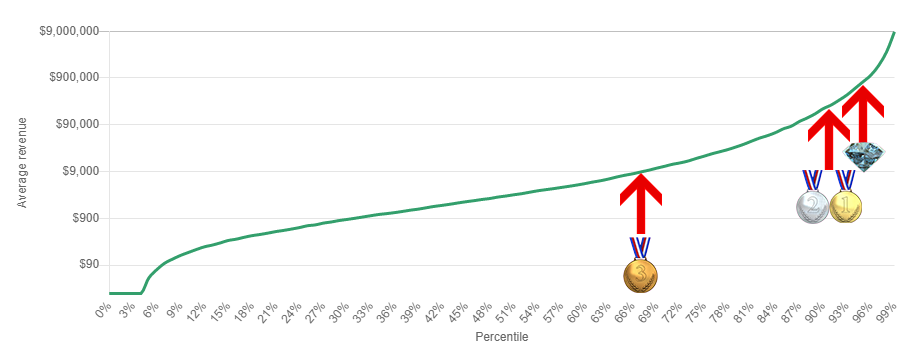This, although I think the current challenge in gaming is the logistics part. Connecting the demand with the supply is where the industry still struggles. Even now who knows how many great games there are buried somewhere within the depths of Steam with <100 reviews and thus limited storefront visibility.
I'm going to nitpick here and mention that the proper term for that is marketing not logistics.
A bit of a topic derailment on my end here, but anyway this is a known problem, indies complain about it a lot, and you can easily find interesting data like the below showing how the bulk of indies are pretty much flops from a financial point of view, even if just one dude made them:
Source:
https://gameworldobserver.com/2022/11/29/median-indie-game-earnings-steam-barely-over-1000
Now granted what
Tyranicon wrote is pretty much spot on, from my own purely amateurish poking and dissection of this subject I came to the conclusion (also touching upon Tyranicon's post) that the only real choices an indie hopeful has, that is one without enough FFF (friends, family, fools) cash to blow on professional shilling by an agency, are:
1. Take a loss on the first 2 or 3 games hoping you start building brand recognition over time (if you are not shit at game dev of course, but everyone thinks they're not) and eventually the next game break even or turns a profit because the small fanbase grows. This probably works best if you do low-technical investment cheap stuff like visual novels where you can afford to do it in your spare time at a loss of just free time. I saw posts of some indie devs who took this approach and claimed it worked, I mean it makes sense, it works for would-be novelists.
2. Mod a popular game and only make your own game as a successor to the mod once your mod has gained enough brand recognition, very similar to 1 but you get free targeted exposure on fan communities of the game you modded. This is the CS, DOTA, Left 4 Dead, Terra Invicta etc. approach, although those first 3 got patronage from Valve so not really indies I guess, but I think you get what I mean when I say do modding first to make a name for yourself.
3. Make a fucking good pitch to a publisher, secure a deal that has them get you exposure at PAX or some other convent or via press shilling/newsletters the publisher does, even if you get jack shit of revenue on your first game with them (it's their risk). I think this is what Highfleet and a few other (revived) Microprose releases did? This is the only way journos might ever write about your work, unless you win the lottery as described in 4. Sure, it goes against being a truly independent developer, but like with everything it depends on the trade off, current business context including needs, long term strategy and the specifics of the contract. By which I mean that eventually if you make games that sell you will gain enough brand recognition that you no longer need publishers.
4. Win the lottery the Stardew Valley, Kerbal Space Program, Rimworld way - strike gold by filling a market void in an existing market where the target group happens to be as passionate as they are starved for new experiences, so word of mouth really kicks off. There's an obvious catch here, none of the devs behind those games expected them to be runaway successes, so how can you? But in all cases there was precedent showing someone would buy it (SV - Harvest Moon, KSP - Orbiter, where the creator hanged around, Rimworld - dwarf fortress), and it was known the market need is not being satisfied, so the big question was how big the untapped market was. Most indies on the other hand go with the flow into saturated markets or follow the leader (deckbuilders, pixelart platformers, survival games etc.) which dooms them, doing that without a very good plan how to beat the large competition is probably the biggest indicator how clueless from a business sense point of view a hopeful indie developer is. It's the equivalent of failing a [business] skill check with a difficulty of 1, it's like dying to the first fucking rat just outside of Vault 13's door in Fallout. Also as a side note: out of those 3 I mentioned I think only Rimworld did crowdfounding which helped gauge market interest and confirm some assumptions, not sure how good that is nowadays since people might have been burned by that (fucking Battletech, in my case), but failing a kickstarter was a good red flag telling you the project is doomed to fail to turn a profit even if it is ever finished.
Either way the likely result is that you will spend a lot of manhours (and possibly money) over a long period of time before you start turning a profit (and that is likely to never happen), regardless if this is because your first releases under-perform, you do free mods, you shill your own game hard as fuck on your own or because the publisher's cut will leave you with nothing.
 Those games are rare and so their crowd.
Those games are rare and so their crowd.





















![Glory to Codexia! [2012] Codex 2012](/forums/smiles/campaign_tags/campaign_slushfund2012.png)









